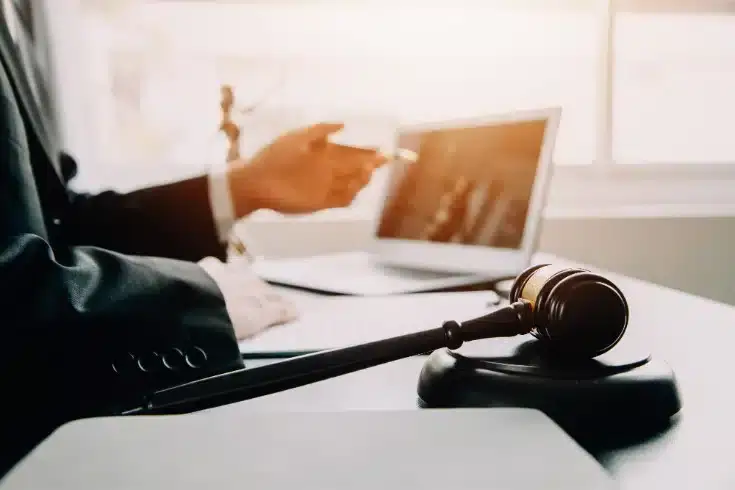How Long Does It Take to Remove Articles Reporting Criminal Records and Previous Convictions Under Real Names?

Your personal information, particularly your criminal record and past convictions, can cause significant problems if they become publicly available on the internet under your real name. This could hinder your job hunting or career change efforts, put you at a disadvantage at your workplace, make dating or marriage difficult, cause trouble for your family due to slander from those around you, or even prevent you from being able to rent a property.
In this article, we will discuss the particularly important elements of the time elapsed since the crime and the success or failure of deletion when it comes to removing articles about your criminal record and past convictions.
Comparing and Weighing the Removal of Articles on Criminal Records and Prior Convictions
First, let’s briefly explain the general concept of removing articles on criminal records and prior convictions, which is not limited to the period from the occurrence of the crime.
Since criminal records and prior conviction information are private information, you would claim the right to privacy, a type of right that prevents hindrance to rehabilitation, to request removal. Everyone is guaranteed the right to privacy, but on the other hand, the posting of news articles and the like is an act based on freedom of expression, so even after a person has paid for their crime and returned to society, the balance between the two becomes an issue.
The removal of articles on criminal records and prior conviction information is judged based on the theory of “comparative weighing”. The criteria generally include:
- Whether the person was prosecuted
- The period since the crime was committed
- Whether efforts have been made towards rehabilitation
- Whether there is a need for removal
These factors above are comprehensively judged.
In other words, it’s not a matter of “removal is permitted because of XX”, but rather, the criteria are compared and weighed according to individual circumstances, and a judgement is made.
However, this may leave those with a criminal record or prior convictions feeling anxious, wondering, “Can I have articles that reported my real name removed?” In particular, they may question, “How much time must pass in my case before removal is permitted?”
This element of “passage of time”, or how much time must pass before an individual’s private information can no longer be considered a “matter of public interest”, is of utmost concern. Therefore, we would like to consider how much time is required by giving various examples and looking at how the above criteria are applied in each case.
Case where Google search results for violation of the Act on Punishment of Activities Relating to Child Prostitution and Child Pornography were not allowed to be removed

A man who was fined 500,000 yen for violating the Japanese Act on Punishment of Activities Relating to Child Prostitution and Child Pornography, sought to have information about his arrest removed from Google’s search results, as articles about his arrest were still displayed when his name was searched, even more than three years after the incident. However, in July 2016, the Tokyo High Court overturned a provisional injunction decision by the Saitama District Court that ordered the removal of the posted articles (the so-called “right to be forgotten” judgment).
Since the statute of limitations for public prosecution of child pornography cases is either three or five years (Article 250 of the Japanese Code of Criminal Procedure), the man argued that, “In this case, once a period of time equivalent to the statute of limitations has passed, public interest diminishes and there is no public interest (i.e., there is no reason to prevent illegality), and the display of these search results becomes illegal.” However, the Tokyo High Court stated:
The act in question, child prostitution, is a matter of high social concern for the prevention and strict enforcement from the perspective of healthy development of children, and it is clearly a matter of great concern for parents, especially those raising female children. Considering the nature of the act in question, even if about five years have passed since its occurrence, and even if the other party is a citizen, the fact that the effect of the sentence has not been lost within five years after the payment of the fine (Article 34-2, Paragraph 1 of the Japanese Penal Code), it should be said that the act in question is still a matter of public interest.
(Tokyo High Court, July 12, 2016 judgment)
The “Article 34-2, Paragraph 1 of the Penal Code” mentioned here is as follows:
Article 34-2 of the Japanese Penal Code
1. When ten years have passed since a person completed the imprisonment without work or a greater punishment or the person had such punishment remitted without another sentence of a fine or a greater punishment being imposed, the sentence ceases to have effect. The same applies when five years have passed since a person completed a sentence equal to or less than a punishment or had the execution of such punishment remitted without another sentence to a fine or a greater punishment being imposed.
It is reasonable to think that the time required for a request to remove a crime report varies depending on the severity of the crime and the size of its social impact, and that the period until a removal request can be made is shorter for lighter crimes and longer for heavier crimes.
Since the severity of a crime and the size of its social impact are not determined solely by the name of the crime, it should be considered that the time required for a removal request also varies depending on the actual behavior of the crime, the result, and the punishment.
Nevertheless, if we uniformly use Article 34-2, Paragraph 1 of the Penal Code as a standard, the result will be that a removal request cannot be made until five years have passed for a fine, regardless of the amount, and until ten years have passed after the execution of a prison sentence, regardless of the length of the sentence.
This can be said to be extremely unreasonable. The Supreme Court (in the non-fiction “Reversal” judgment) has indicated that “after a person has received a guilty verdict or has completed his/her sentence, it is expected that he/she will return to society as a citizen, and therefore, he/she has an interest in not being hindered in his/her rehabilitation by the publication of facts related to his/her criminal record, and in not being disturbed in his/her newly formed social life,” and does not presuppose long-term additional sanctions.
Later, the Supreme Court also dismissed the appeal and overturned the original decision of the Saitama District Court, but it was said that the judgment was determined by the crime of child prostitution rather than the period from the occurrence, and there were voices saying, “Is it a value judgment that it is better to expose obscene cases?”
If that is the case, the Supreme Court itself would be going against the principle of comparative weighing, but if you read the judgment carefully, it says, “Considering that the search results in question are part of the search results when the name of the appellant and the name of the prefecture where the appellant resides are used as conditions, it can be said that the range in which the facts in question are transmitted is somewhat limited.”
In other words, it can be understood as a judgment that “since the information about the person’s arrest is found only when the person’s name and prefecture are searched, the range of transmission is narrow.” If you think about it, it does not contradict previous precedents.
This is because it has been stated that “whether or not an unspecified number of general people can identify the person as the person involved in the case should be judged based on this” (Supreme Court, March 14, 2003 judgment).
Then, what kind of judgment would be made if the information is found by searching only the name, that is, if the range of transmission is not limited? Also, what kind of judgment would be made if more than ten years have passed since the occurrence?
Example of a Case Where Google Search Removal of a Violation of the Japanese Dentist Law Was Not Granted
A male dentist who runs a clinic in Yokohama requested the removal of search results from Google, operated by the U.S. company Google, when a search of his name revealed that he had been arrested on suspicion of violating the Japanese Dentist Law and had received a summary order for a fine of 500,000 yen.
This dentist was arrested and fined 500,000 yen for allowing someone without a dental license to examine patients. The fact of his arrest was reported in the newspapers and spread via the internet. As a result, he suffered damages such as a decrease in patients and lack of job applicants, even after more than 10 years. He filed a lawsuit seeking removal, but the first instance judgment did not grant the removal, stating that “the degree of damage is not severe”.
In the appeal judgment of this lawsuit, the Tokyo High Court supported the Yokohama District Court’s decision to dismiss the claim, stating that “it is still a fact related to the qualifications as a dentist and is of public interest”. The man’s appeal was dismissed. Looking at other cases, the judgment is strict against crimes related to qualifications, criminal records, or arrest history, or in other words, crimes that seem to misuse qualifications. This is a result of considering “social status and influence”, and different demands are made compared to when “returning to society as a citizen” (Supreme Court: Non-fiction “Reversal” judgment).
Example of a Case where Removal Was Granted
As stated above, there are no written statements on the time span required to seek for removal of articles reported under real name. It is exclusively up to the interpretation of the right to injunction based on personal rights. In that case, it is common to go under provisional disposition procedure to seek for removal of online articles, but provisional disposition procedures are not open to public.
Therefore, the precedents mentioning on criterion of time elapsed is only accumulated in private procedures, so information are not shared at a satisfactory level between lawyers, even requests to remove the articles under real names which reports his/her criminal are an area where allegations are frequently filed.
They only could share their experiences in associations, and as the judgements are principally not open to public, they could not analyze objectively.
There are many cases in which the allegation of removal was granted, but comparing them is not so beneficial. It is because they are the result of comparative weighing, and there are no cases where all the aspects are equally same.
It is rather the “cases that the removal was not granted” that need to be analyzed. The outcome depends on whether or not the attorney can respond with effective measures based on experience and tailored to the individual situation, such as emphasizing that “rehabilitation efforts are being made in this manner” and carefully detailing the “essentialness of the removal”.
The removal of criminal history and conviction articles is a highly specialized area and should be discussed with and retained by an attorney who is experienced in this area.
Category: Internet





















